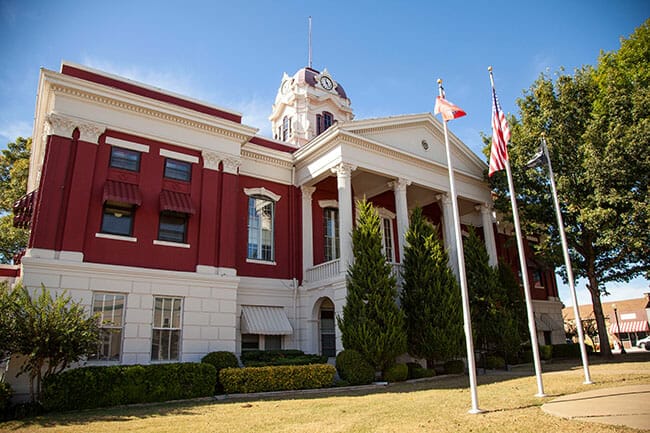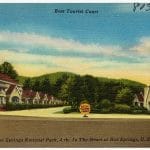

Uh oh...
It appears that you're using a severely outdated version of Safari on Windows. Many features won't work correctly, and functionality can't be guaranteed. Please try viewing this website in Edge, Mozilla, Chrome, or another modern browser. Sorry for any inconvenience this may have caused!
Read More about this safari issue.

This year, the National Park Service celebrates its centennial anniversary and urges Americans to explore 100 miles of National Parks—be it by canoe, horseback or on foot; this is not hard to achieve in Arkansas. In a state with seven national parks and a beautiful landscape of rivers, lakes, waterfalls and forests, the Buffalo National River is a particularly lovely example of why Arkansas is touted as the Natural State.
To prevent the river from being dammed, advocates pushed for the Buffalo to be nationalized under the National Park Service. On March 1, 1972, Congress designated the Buffalo River as the first National River in the United States. Today there are many ways to experience and enjoy the Buffalo National River, one of the few rivers in the nation that remains undammed.

That the river was preserved instead of dammed is appreciated by those who enjoy float trips, a regional term generally referring to a relaxed cooler-laden canoe trip with a group of people. The Buffalo River stretches 150 miles, beginning in the Boston Mountains in Newton County and ending in the White River in Buffalo City.
A 15-mile stretch at the Upper Buffalo is known as “the Hailstone”; during times of heavy rainfall, this is an area of rapids and white water, a true challenge to thrill-seeking kayakers. The middle to lower Buffalo, where the river is wide and slow-moving, is more popular for float trips. There the Buffalo often resembles a lazy river, complete with tourists in inner tubes. In fact, critics of the plan to nationalize the river dismissed the Buffalo as good for little else apart from the spring and early summer months when the water level is up and people float it.

While the spring and early summer months are certainly the best time for float trips, kayaking and canoeing are possible at different parts of the river nearly year-round, though it may be with difficulty. Still, recreation in the Buffalo National River park grounds is far more inclusive than just floating.
The off-season for floating, fall and winter, is the best time to hike the over 100 miles of trail in the wilderness surrounding the river. In addition to the Buffalo River Trail, which joins the Ozark Highlands Trail, there are plenty of trails of day trip length to scenic locations, such as the Compton Trailhead to Hemmed-in-Hollow, the tallest waterfall between the Rockies and the Appalachians, and historic locations such as Colliers Homestead in Tyler Bend.
At least a dozen campsites line the Buffalo, and the river is good for bass fishing and sighting wildlife, including black bears, elk and even bald eagles. Over 360 documented caves exist within the Buffalo National River area, though most are currently closed. The park has more than 75 miles of trails and four campsites that can accommodate camping with horses. Photography is another popular interest to pursue around the river. Hawksbill Crag is one of the most-photographed locations in the state.

The National Geographic lists the Buffalo National River as the second most underappreciated national park in America. This sort of backhanded compliment is amended by findings from a National Park Service survey. It discovered nearly 1.2 million visitors flocked to the Buffalo River in 2011. The draw is the captivating wilderness scenery of the unimpeded river, lined with limestone bluffs as tall as 500 feet. The river, also classified as a Wild River and Scenic River, is more than a local landmark—it’s a national treasure.

Join the Conversation
Leave a Comment
13 responses to “Appreciating the Buffalo National River”
 Leave a Reply
Leave a Reply
We do the work.
You check your email.
Sign up for our weekly e-news.
Get stories sent straight to your inbox!









 Leave a Reply
Leave a Reply
[…] Nina Wood operated a successful fishing guide service in the Twin Lakes area on Crooked Creek, the Buffalo River, the White River and Bull Shoals Lake. Repairing boats and working as a fishing guide gave Wood the […]
[…] a recent Saturday, I drove my truck to the Buffalo River with a couple from church, Jamie and Chase, to meet my friend Megan. We were going to kayak from […]
[…] a float trip down the Buffalo River (or the Kings, or the Mulberry), or a hike on the Ozark Highlands Trail. Visit Arkansas’ answer […]
[…] more and more we make the drive over to the Buffalo National River, the more and more I fall in love with that part of Arkansas. The mountains, the wildlife […]
[…] Canyon View Treehouse | Jasper, AR | $198 per night | 8 guests Now, THIS is a view – hope you’re not afraid of heights! And it’s near the Buffalo National River. […]
[…] course, since you are in St. Joe, the Buffalo River provides a great backdrop for a […]
[…] first national river was established in 1972. The picturesque river meanders through the Ozarks providing visitors with opportunities to hike, float quiet pools of […]
[…] Buffalo National River Boston Mountains to the Ozark Mountains […]
[…] foggy views with morning elk calls. But this area is also great for summer adventures exploring the Buffalo River waters and hidden swimming holes. Check-in with the Buffalo Outdoor Center when you arrive for an […]
[…] so much time in the restaurant, as we all know. We have a cabin in Jasper, so we will go float the Buffalo or something like that. But really, those outdoor activities are how I love to […]
[…] ¾-mile from the Buffalo River they offer RV sites with 30 amp/water and primitive tent sites. Amenities include showers and a […]
[…] Buffalo National River – The Nation’s first national river is a sight to see any time of the year. Join a float trip at Buffalo River Outfitters or Silver Hill. Camp at Tyler Bend and learn about the history of the Buffalo River and get your National Parks Passport stamped at the Tyler Bend Visitor Center before you head out for a hike on one of the many trails. […]
[…] Buffalo National River […]